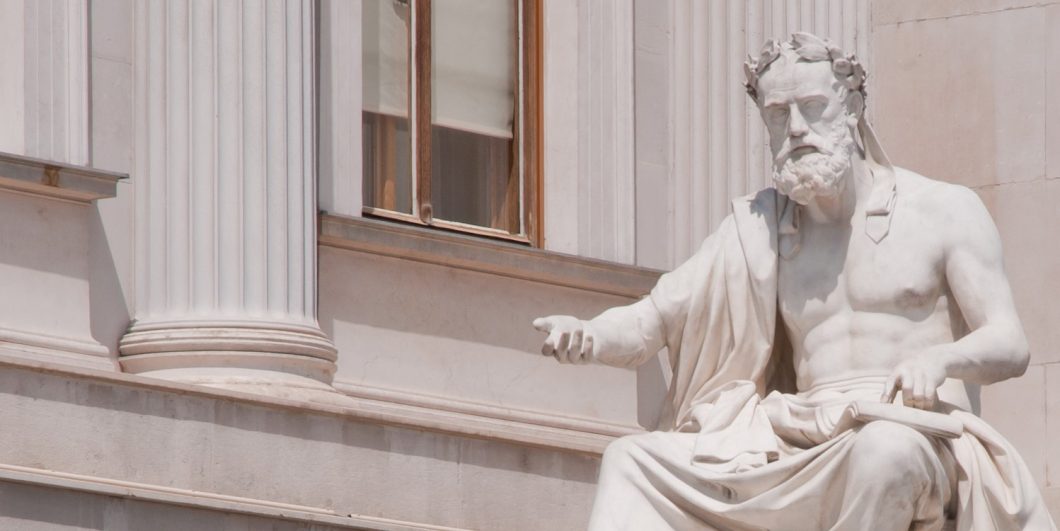Xenophon (430-354 BCE) is best remembered as a great military leader, but he was also a prolific author. Fortunately, many of his works still survive. A fresh look at these texts has just been published by Bloomsbury; it is not written by a professor however. Yun Lee Too is described as an independent scholar in the UK.
Even so, his study of Xenophon has been given the stamp of approval by Dr. Timothy Duff, Professor Classics at the University of Reading. On the book cover, he writes that Too “with remarkable clarity and concision argues that scholars have missed a fundamental aspect of Xenophon’s works: their ironic takes of their subject matter.”
According to American philosophy professor Donald Verene, “An irony grasped will establish and record a point more easily and firmly than any argument concerning it.” Too has certainly grasped the irony in Xenophon’s corpus, to such an extent that professional scholars cannot ignore it.
Early on in the book, Too tackles one of the most-studied incidents of ancient times: the trial and death of Socrates. That he has arrived at a much more nuanced interpretation of Socrates’ defense than other scholars is a gem of scholarly analysis and a most welcome antidote to other explanations which I have always felt seemed not only forced, but driven by contemporary beliefs that were being mapped onto ancient Athenian society.
Plato’s Apology is the most frequently-cited text on the subject of the trial. This is unfortunate as “Xenophon chooses a wider perspective for the trial than Plato.” Too takes aim first at the interpretation by Gabriel Danzig (Bar Ilan Univ.), who argues that Xenophon’s work (also named Apology) “attempts to absolve Socrates of his rather incompetent showing in court. Elsewhere, Danzig suggests that Socrates is actually arranging his own suicide.” Too counters: “To view the text this way misses the whole point of what Xenophon is trying to suggest.” Crucially, Too realizes that Xenophon states Socrates “regarded death as more desirable than life, a fact not known to other writers on the trial and death of Socrates, and so, his bold defence seems ill-considered, even rather thoughtless.” While the “Platonic” version of Socrates “sees his death as the outcome of his divine mission to keep philosophizing,” the version given to us by Xenophon shows that “Socrates is willing to go to his death to avoid the debilitations that come with old age.”
It is within “the gap between Socrates’ behaviour in the lawcourt and what others perceive to be the case” that Too locates the chief irony of Xenophon’s Apology. Here he takes issue with Piero Pucci (Cornell Univ.) who “sees the main irony as lying in the fact that the city (Athens) wants money and glory, which Socrates is not at all interested in. I, however, argue that the concern is primarily with the understanding of the gods and their role in human life.” By trying to keep clear of impiety, “Socrates emerges as a righteous man.” Xenophon himself tells us that his account of the trial seeks to reconcile the lofty speech of Socrates and his resolve. “Other writers,” states Too, “have failed to do this so that his lofty speech seems to be rather senseless.”
This leads him to the key point of his thesis about the trial. “Xenophontic irony is distinct from the Socratic because it is literary rather than oral. Where Socrates engaged only in conversational interactions, Xenophon is a writer, who presents what he perceives to be truth against a backdrop of ignorance… He seeks through the literary text to achieve irony’s goal of instructing the unenlightened mass.”
Too takes a step back to employ an analogy to explain what he is getting at. “Irony may be present but it depends ultimately upon the reader to perceive it. It is like a picture, usually comprised of dots, in which another picture or design is hidden. When that other picture is not perceived, one has a certain view of the whole; when that other picture is distinguished, one then has a very different view of the whole, as two pictures. These, accordingly, are the works of irony.” In the case of Socrates, the Athenians as a whole are unable to perceive that Socrates was indeed pious.
“Most of the people in the world will not perceive the truth, and therefore, they are caught up in the ignorance that makes them subject to the ironic. Remarkably, Xenophon simply has Socrates state the facts about his life and beliefs: irony involves no shifts in tone or perspective.”
The Apology of Xenophon thus contains two pictures, not only about the misperceptions that resulted in the trial, but the “pervasive misperceptions of the realities that Xenophon presents to his audience. The work is thus a re-enactment of the irony experienced in the trial of Socrates in the works of Xenophon.” It is this complex irony that other scholars have missed. And this revelation is all in the first chapter! Quite masterful.
I will look here at just one more instance of irony. Xenophon’s most famous work is Anabasis. While conventionally regarded as a historical text, Too writes “the Anabasis must overall be an ironic text. The narrator (Xenophon) knows after the event the outcome of decisions and actions taken in the story whereas Xenophon the character and actor does not have this larger perspective. If irony lies most essentially on a different knowledge between actors, then irony may be assumed in light of the double presence of Xenophon.”
His exploration of the text shows that “the irony has to do with the realization that Greek unity is much more important than relying on a foreign power,” in this case, Persia…But there is a second greater irony: the Anabasis is a justification of Xenophon as a military and political leader, who ultimately seeks to form a civic community.” All, of course, written by Xenophon himself! Thus he uses both Socrates and himself to elicit various forms of irony in his literary corpus.
The varied alliances of Xenophon are the motivating factor for his use of the ironic, says Too. At times he allied himself with Athens, at other times with their mortal foes, the Spartans and even the Persians. “Irony is a mode of subtle but damning criticism in Xenophon’s hands…In political terms irony is very clever and dexterous, enabling the author to play both sides of an issue with the less aware ignorant of this double play. If one realizes that Xenophon lived a rather precarious existence in the Greek world, then irony makes complete sense.”
Future studies of Xenophon will be obliged to reference this book. Too has made it an essential text.
There is a typo on Page 187: “way and distinctly” should read “way distinctly”
Xenophon’s Other Voice: Irony as Social Criticism in the 4th Century BCE is by Bloomsbury. It lists for $108 (hardback) or $36 (paperback)
For more on the book by Dr. Verene from which I took the quote, read my review in Sun News:
https://sunnewsaustin.com/2023/02/21/philosophy-rhetoric/

